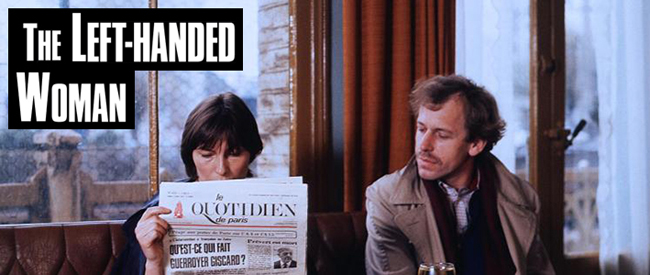
THE LEFT-HANDED WOMAN
a.k.a. Die linkshändige Frau
Dir. Peter Handke, 1978
West Germany, 119 min.
In German and French with English subtitles.
SATURDAY, AUGUST 2 – 7:30 PM
WEDNESDAY, AUGUST 13 – 10:00 PM
SUNDAY, AUGUST 24 – 7:30 PM
Peter Handke, one of the most celebrated Austrian writers of the post-war generation, was primarily a playwright and a novelist, but he also tried his luck in the cinema. Between 1971 and 1992 he directed four feature films and worked on the screenplays for THE GOALIE’S ANXIETY AT THE PENALTY KICK (1972), THE WRONG MOVE (1975), and WINGS OF DESIRE (1987), all for Wim Wenders to direct. THE LEFT-HANDED WOMAN is Handke’s second self-adaptation, this time directed by himself and produced by Wenders.
Despite boasting an international cast, THE LEFT-HANDED WOMAN is an understated and unadorned portrayal of a single mother’s quotidian life, comparable in its sensibility to some of the work of Margarethe von Trotta, Helke Sander, and Helma Sanders-Brahms. Edith Clever (the star of Eric Rohmer’s Kleist adaptation, The Marquise of O) plays Marianne, a German living in Paris with her young son, Stefan. Her husband Bruno Ganz (WINGS OF DESIRE, THE AMERICAN FRIEND, DOWNFALL) returns from Helsinki, where he has spent several months and learned only one word in Finnish: olut (‘beer’). After a night of luxurious squandering in a hotel restaurant—where Bruno admires the centuries-old feudal tradition that headwaiter Michael Lonsdale (Truffaut’s STOLEN KISSES, Marcel Hanoun’s SPRING) represents—Marianne tells Bruno they should separate. The film is thus framed as a chronicle of this new turn in Marianne’s life: she resumes working as a translator, oscillates between resentment and tenderness toward her son, dreads Bruno’s increasingly aggressive visits, and becomes closer with Franziska, a German expatriate elementary school teacher played by Angela Winkler (Schlöndorff’s THE LOST HONOR OF KATHARINA BLUM).
Like the films of another part-time-cinéaste author, Marguerite Duras, THE LEFT-HANDED WOMAN is characterized by very deliberate pacing and precise, measured dialogue. But unlike Duras, Handke’s film is punctuated with sight gags, like Marianne in high heels walking on stilts in her living room and a cameo by a europunk Gérard Depardieu. There is also a walk-on part for Rüdiger Vogler (Wenders’ ALICE IN THE CITIES, von Trotta’s THE GERMAN SISTERS) as a milquetoast actor. In all its sparseness, THE LEFT-HANDED WOMAN is an exceptionally moving film about escaping from oppressive relationships, reactivating stagnating ones, and becoming open to new ones.
